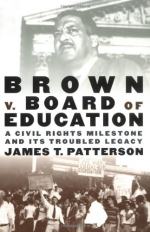|
This section contains 863 words (approx. 3 pages at 400 words per page) |

|
Summary
Although foes of President Franklin Roosevelt claimed he stacked the Supreme Court with liberals, the court was supposed to be non-partisan. There is evidence that he was never non-partisan. Chief Justice Roger Taney was a southern sympathizer who handed down the decision in the Dred Scott case which incited the Civil War. The Court had imposed its racist interpretations on Plessy. Conservative justices during Roosevelt’s presidency threatened to sabotage the advancements under the New Deal. When Brown arrived at the Supreme Court, the panel consisted of liberals and moderates all appointed by Roosevelt and Truman. There were bitter internal conflicts and strong philosophical differences within the court. Most followed the policy of judicial restraint and were careful not to strike down state or federal laws. Justice Hugo black was a strong advocate of constitutionally-guaranteed rights and carried a worn copy...
(read more from the Chapter 3: The Court Decides Summary)
|
This section contains 863 words (approx. 3 pages at 400 words per page) |

|




